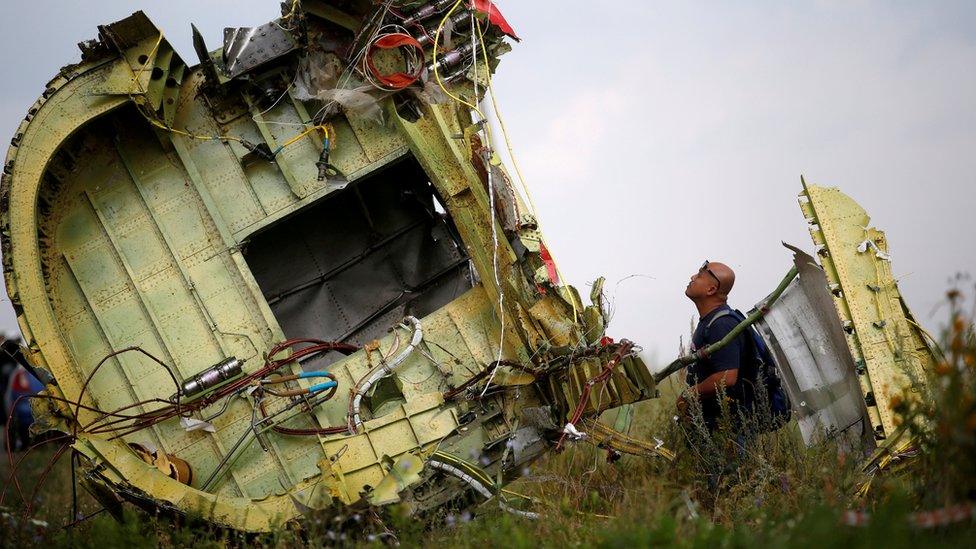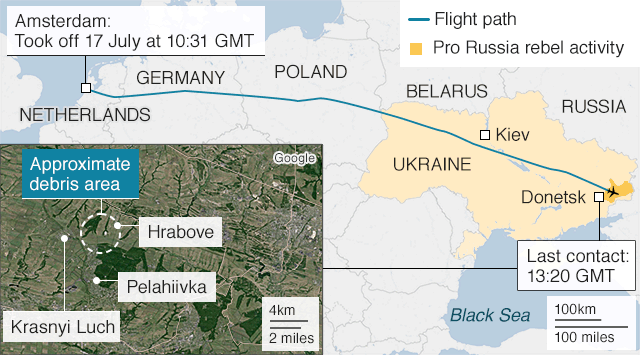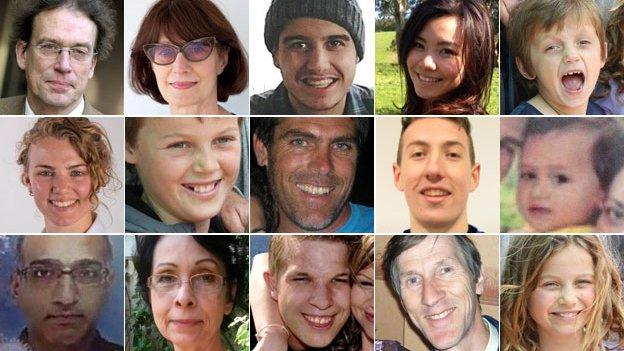MH17 disaster: Phone-taps 'show Russia directed Ukraine rebels'
- Published

The plane was en route from Amsterdam to Kuala Lumpur when it was shot down over a rebel-held area of eastern Ukraine
An international inquiry into the downing of Malaysia Airlines flight MH17 believes high-level Russian officials were directing separatists in eastern Ukraine linked to the attack.
Investigators allege a top aide of President Vladimir Putin was in contact with rebel leaders on a regular basis.
All 298 people on board were killed when a missile struck the plane over rebel-held territory on 17 July 2014.
Russia's foreign ministry has rejected the latest findings.
Spokeswoman Maria Zakharova said international investigators had manipulated the inquiry to suit a predetermined conclusion.
"They publish some material, part of which turns out to be fake, and another part is not confirmed." she told reporters.
Investigators have charged four people, including a separatist defence chief. The suspects are due to go on trial, probably in absentia, in April 2020.
What do the investigators say?
The Netherlands-based inquiry team have not linked Russia directly to the attack on the plane but they say "intercepted phone-calls" show contact with two of the four suspects already charged with murdering the passengers and crew.
While MH17 is not mentioned in the phone-taps, provided by Ukraine's SBU intelligence, investigators believe Moscow officials knew what was going on on the ground and had influence over "administrative, financial and military matters" in the separatists' self-styled Donetsk People's Republic (DPR).
How does a Buk missile system work?
The inquiry has already said the Bukh Telar missile launch system came from Russia's 53rd Anti-Aircraft Missile Brigade based at Kursk.
They are now appealing for more witnesses to come forward.
Who are the high-level Russians?
The inquiry team names Vladislav Surkov, a former Kremlin strategist and deputy prime minister, and Sergey Aksyonov, the man placed in charge of Crimea when it was occupied and annexed by Russia months before.
They say Russian Defence Minister Sergei Shoigu is also mentioned in several calls.

"The indications for close ties between Russian government officials and leaders of the DPR raise questions about their possible involvement in the deployment of the Buk Telar which brought down flight MH17 on 17 July 2014," said Andy Kraag, head of the criminal investigation division of Dutch police.
What is in the phone-taps?
Two of the suspects already charged are mentioned in the phone-taps. Igor Girkin was so-called defence minister in the DPR and, according to prosecutors, Sergei Dubinsky was his deputy.
DPR leaders always insisted they were volunteers not directed by anyone but the inquiry team says it has spoken to witnesses who say key figures were directed from within Russia.
They say DPR leader Alexander Borodai was recorded, external saying: "I'm carrying out orders and protecting the interests of one and only state, the Russian Federation. That's the bottom line."
They also quote Mr Borodai apparently talking to Vladislav Surkov a fortnight before the MH17 disaster talking about Russian reinforcements.
An animated video from the Dutch Safety Board shows the damage to the plane and how it was caused
Investigators believe leading rebels were equipped by Russia's FSB security service with secure phones that cannot be tapped and operate via the internet, apparently nicknamed "the glass".
Sergei Dubinsky, they allege, called someone named Semenov saying: "Those are special phones, you cannot buy them. They are gotten through Moscow. Through FSB."
Although four people have been charged and are due to go on trial in April, probably in absentia, it is thought more evidence could yet emerge from rebel ranks in the DPR.
The aim of the inquiry team is to find out who ultimately pushed the button that brought down MH17 en route from Amsterdam to Kuala Lumpur and who was in charge.
The 298 who died included 193 Dutch nationals, 43 Malaysians, 27 Australians, 12 Indonesians, 10 Britons, four Belgians, four Germans, three Philippine nationals, one New Zealander and one Canadian.
Russia has argued that the investigation and trial is aimed at discrediting the country in the eyes of the international community.
- Published28 July 2014

- Published19 June 2019
